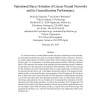Free Online Productivity Tools
i2Speak
i2Symbol
i2OCR
iTex2Img
iWeb2Print
iWeb2Shot
i2Type
iPdf2Split
iPdf2Merge
i2Bopomofo
i2Arabic
i2Style
i2Image
i2PDF
iLatex2Rtf
Sci2ools
NECO
2007
2007
Variational Bayes Solution of Linear Neural Networks and Its Generalization Performance
It is well-known that, in unidentifiable models, the Bayes estimation provides much better generalization performance than the maximum likelihood (ML) estimation. However, its accurate approximation by Markov chain Monte Carlo methods requires huge computational costs. As an alternative, a tractable approximation method, called the variational Bayes (VB) approach, has recently been proposed and been attracting people’s attention. Its advantage over the expectation maximization (EM) algorithm, often used for realizing the ML estimation, has been experimentally shown in many applications, nevertheless, has not been theoretically shown yet. In this paper, through the analysis of the simplest unidentifiable models, we theoretically show some properties of the VB approach. We first prove that, in three-layer linear neural networks, the VB approach is asymptotically equivalent to a positive-part James-Stein type shrinkage estimation. Then, we theoretically clarify its free energy, gene...
| Added | 27 Dec 2010 |
| Updated | 27 Dec 2010 |
| Type | Journal |
| Year | 2007 |
| Where | NECO |
| Authors | Shinichi Nakajima, Sumio Watanabe |
Comments (0)

